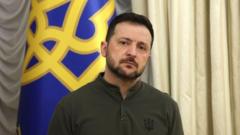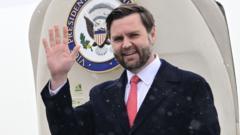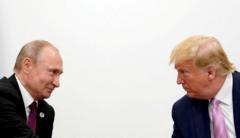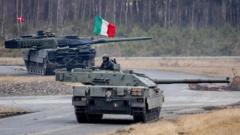As the Trump administration engages in dialogue with Russia, Ukraine's position weakens, stirring anxiety about future support and the implications of emerging U.S.-Russia relations.
Warming U.S.-Russia Relations Create Challenges for Ukraine

Warming U.S.-Russia Relations Create Challenges for Ukraine
Trump's recent outreach to Russia raises concerns for Ukraine as discussions shift towards mineral rights and peace talks without clear Ukrainian involvement.
In a critical moment for Ukrainian President Volodymyr Zelensky, tensions now seem heightened as foreign discussions unfold regarding the country's future in the face of softening U.S.-Russia relations. Recent events paint a worrying picture, with the Trump administration demanding $500 billion in Ukrainian mineral rights. Furthermore, the unceremonious cancellation of Ukraine's exemption from U.S. steel tariffs adds pressure to an already fraught situation. Notably, Vice President JD Vance, known for his skepticism toward military aid for Ukraine, was en route to Europe for meetings, amplifying uncertainties.
The situation escalated sharply on Wednesday when Trump’s Defense Secretary presented a bleak forecast for Ukraine amid its ongoing war with Russia. Shortly thereafter, Trump revealed that he had initiated a conversation with Russian President Vladimir Putin, which he portrayed as the start of diplomatic efforts aimed at resolving the conflict—without laying out a defined role for Zelensky in these potential negotiations.
Experts are voicing apprehensions over this perceived shift in geopolitical dynamics. Cliff Kupchan, Chairman of the Eurasia Group, remarked that Zelensky appears to be on unstable ground, battling challenges both locally and internationally. Trump’s series of actions—including a recent prisoner exchange with Russia—demonstrate a marked thaw in relations that could lend an advantageous hand to Putin in any forthcoming peace agreement, potentially sidelining Ukraine’s interests in the process. Despite reaching out to Zelensky, Trump failed to clarify the extent of Ukraine's involvement in the anticipated peace talks, leaving the future prospects of the nation shrouded in uncertainty.
The situation escalated sharply on Wednesday when Trump’s Defense Secretary presented a bleak forecast for Ukraine amid its ongoing war with Russia. Shortly thereafter, Trump revealed that he had initiated a conversation with Russian President Vladimir Putin, which he portrayed as the start of diplomatic efforts aimed at resolving the conflict—without laying out a defined role for Zelensky in these potential negotiations.
Experts are voicing apprehensions over this perceived shift in geopolitical dynamics. Cliff Kupchan, Chairman of the Eurasia Group, remarked that Zelensky appears to be on unstable ground, battling challenges both locally and internationally. Trump’s series of actions—including a recent prisoner exchange with Russia—demonstrate a marked thaw in relations that could lend an advantageous hand to Putin in any forthcoming peace agreement, potentially sidelining Ukraine’s interests in the process. Despite reaching out to Zelensky, Trump failed to clarify the extent of Ukraine's involvement in the anticipated peace talks, leaving the future prospects of the nation shrouded in uncertainty.






















